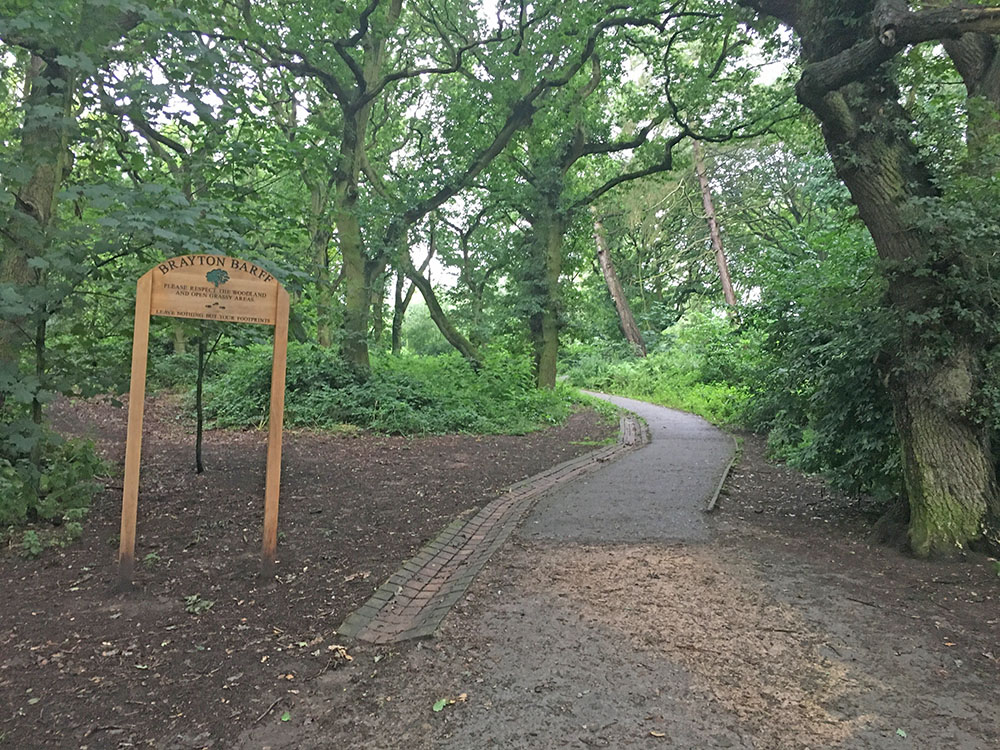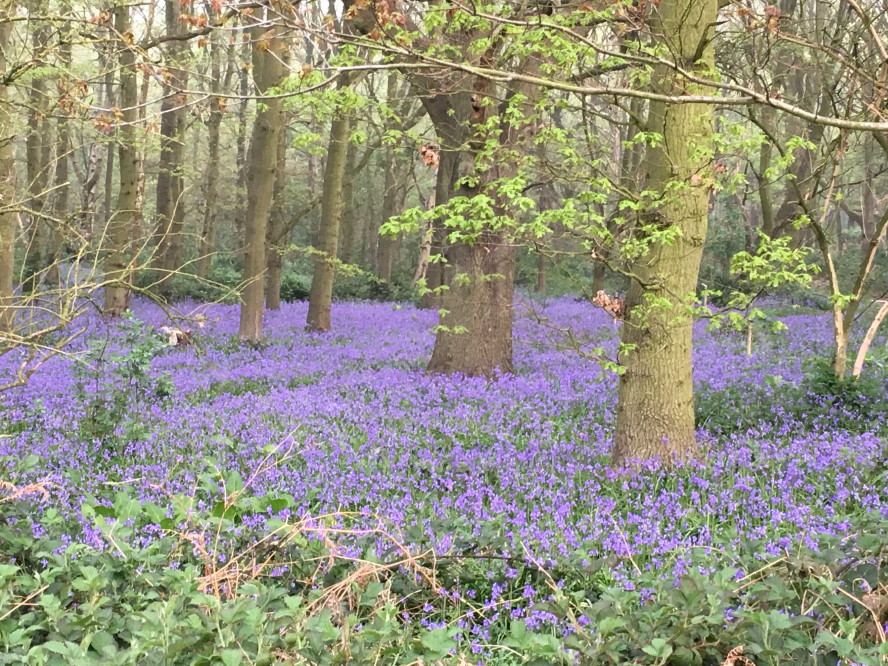Brayton Barff Through the Seasons.
Set in the Vale of York, South West of the market town of Selby and between the villages of Thorpe Willoughby and Brayton, lies Brayton Barff, a sandstone Hill approximately one hundred and fifty feet in height which was formed by glacial movement during the last Ice Age. It is a significant landmark in an otherwise flat landscape.
Today the site is primarily owned by Yorkshire Water with Selby District Council owning a small patch of the land adjacent to the A63 Selby bypass. A large underground reservoir occupies the centre of the site which delivers water to around 4.7 million customers throughout Yorkshire.
Within the Barff woodland over 40% of the trees are Sessile Oak which are generally found in semi natural woodlands in the north of the country. These trees are so called because its acorns are not held on stalks, like those of the English Oak (Pedunculate), but attached directly to the outer twigs. There are also several English Oak trees as well as some cross-hybrid oaks. These trees are known to support many species of flora and fauna, invertebrates, mosses, lichen and fungi.
During the Victorian times it is thought that the shipbuilders on the east coast would come over to the Barff for selected cuts of timber to build their sea going vessels.
The Barff also has a variety of other trees including Silver Birch, Beech, Sycamore, Holly, Rowan, Scots Pine, Alder, Hawthorne and European Larch. There are also several Yew, Willow, Hazel, Horse Chestnut and Wych Elm. As with similar woodlands there are a variety of bushes, including Honeysuckle, Elderberry, Gorse, Broom and Buddleia.
The history of Brayton Barff is quite vague, apparently during 1803 a beacon was lit on the Barff when the country was threatened with an invasion by Napoleon. In May 1935, to celebrate King George V's Silver Jubilee, a Bonfire was lit on the Barff as part of the celebrations.
Early issues of Ordnance Survey Maps dated 1903 clearly show a rifle range on the Barff, extending out to Mill Lane. During the 
Between 2001 – 2004 the A63 Selby bypass, 10km twin lane single carriageway was constructed which severed the South West corner of the Barff, adjacent to Selby Golf Course and resulted in a slight redesign of several holes on the golf course. Wooden fencing was erected as a result of this new road running alongside of the Barff and a footbridge constructed over the ‘new road’ following the line of the Bridal way which extends from Mill Lane. Around 2005/2006 a definite 2metre wide limestone aggregate footpath was laid forming a circular path around the outer edges of the woodland. This footpath is approximately 1.2 miles in length and takes about 30 minutes to circumnavigate at a leisurely pace.
In 2012 the Barff was declared an Ancient Oak Woodland and as such throughout 2012 and 2013 significant work had been carried out by the relevant agencies to cut and remove large swathes of non-native trees, creating at that time huge scars on the landscape. Some three years later the planting of the native trees have become well established and are flourishing. Ongoing maintenance work on the footpath around the bottom of the Barff was completed during the Summer of 2016.
A second phase of woodland maintenance commenced during the Autumn of 2019 with the removal of many old and diseased trees and the cutting back of the Gorse and Broom bushes, especially adjacent to the ‘bypass trail’, this work continued through till March 2020 with re planting continuing into April 2020.
Brayton Barff is a popular site for walkers and bird watchers alike and a path circling the outer perimeter of the Barff makes a pleasant thirty minute walk, giving views looking over towards Selby and the village of Brayton as well as the power stations of Drax and Eggborough..jpg)
For the early risers it is a great place to see some stunning sunrises over the villages of Brayton looking towards Drax Power Station, the same with the Sunsets looking over towards Eggborough and Monk Fryston.
The Barff changes with the Seasons and every visit can reveal something new, the woodland is a haven for wildlife. Records show that since 1982 one hundred and twelve species of bird have been seen in the woodland and at least 40 of those have bred here, including Tawny Owl, Buzzard, Green Woodpecker, Spotted Flycatcher, Goldcrest and Nuthatch to name just a few. On average over 70 species of bird are recorded each year. Further details of the bird life on the Barff can be found on the Brayton Barff Group Facebook page, especially the posts from Derek Cooper. Today ‘The Friends of Brayton Barff group’ led by Derek and a small team of volunteers help keep and maintain the cleanliness of the site as well as recording the wildlife and bird sightings.
The Barff is also home to fifteen different species of mammals, including Muntjac Deer, Pipistrelle Bat, Fox, and Field Vole.
Over eighty species of plant and wildflowers have been recorded, included Bee Orchid, Northern Marsh Orchid, Wood Anemone, Marsh Ragwort, Bluebell, White Bluebell, Bittersweet and Purple and White Foxgloves. Over twenty species of Butterfly have been recorded, including Marbled White, Brown Angus, Speckled Wood, Comma and Brimstone.
During the Autumnal months fungi thrives in this woodland environment, species including Fly Agaric, Beefsteak Tree Fungi, Chicken of the Wood, Sulphur Tufts, Stinkhorn, Ink cap, Puffballs and Hoof Bracket are just some of the many varieties that can be found here.
Click on the galleries shown below to expand the albums.
Tuesday 2nd October 2018
|






























